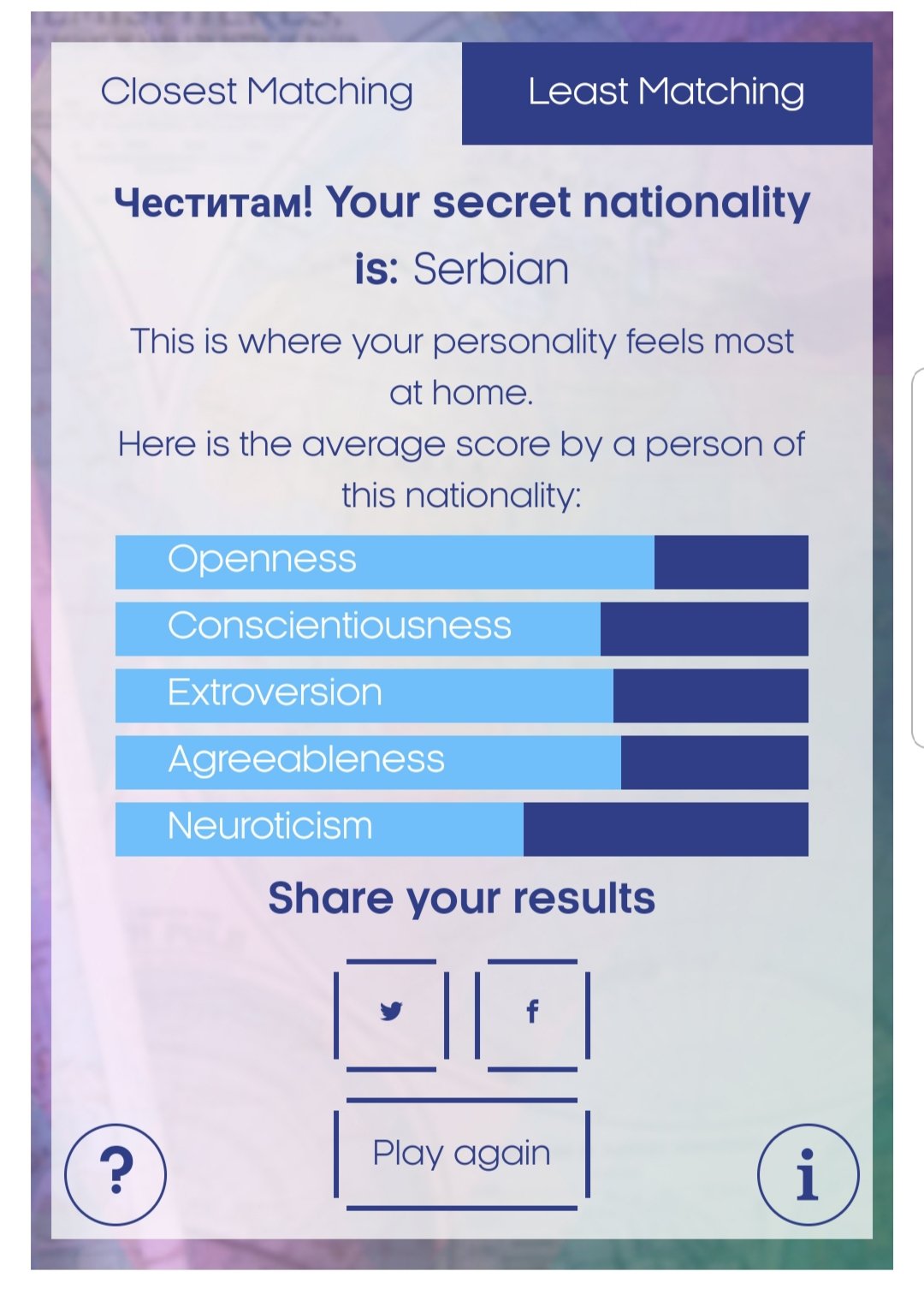Unveiling Your Hidden Roots: What's Your Secret Nationality?
Have you ever felt an inexplicable pull towards a certain culture, a sense of belonging to a place you've never visited, or a curiosity about the origins of your family name? This intriguing feeling often leads to a deeper question: "what's your secret nationality?" It's a query that transcends the simple designation on your passport, delving into the rich, complex tapestry of your ancestry, heritage, and the unspoken influences that shape who you are. In an increasingly interconnected world, understanding our roots has become more accessible and, for many, more vital than ever before.
The concept of a "secret nationality" isn't about hidden documents or clandestine citizenship. Instead, it speaks to the often-unacknowledged or undiscovered threads of heritage that weave through our genetic makeup and family histories. It's about the potential for unexpected ancestral links, the echoes of distant lands in our DNA, and the cultural whispers that might subtly influence our preferences, traits, and worldview. This journey of discovery can be profoundly personal, offering new perspectives on identity, belonging, and the intricate human story we all share.
Table of Contents
- Unveiling Your Hidden Roots: What's Your Secret Nationality?
- The Allure of Ancestry: Beyond Borders and Birth Certificates
- Legal vs. Cultural Nationality: A Complex Tapestry
- Why Does "Secret Nationality" Intrigue Us?
- Practical Steps to Discovering Your Ancestral Ties
- Embracing Your Multifaceted Identity
- The Broader Implications of Ancestral Discovery
Unveiling Your Hidden Roots: What's Your Secret Nationality?
The journey to uncover your "secret nationality" is often sparked by a simple curiosity about one's origins. Perhaps it's a family story passed down through generations, a distinctive physical feature, or a surname that hints at a foreign past. For many, the official nationality listed on their passport tells only part of the story, representing a legal status rather than the full spectrum of their ancestral heritage. This quest is about peeling back those layers, exploring the historical migrations, cultural intermingling, and genetic legacies that contribute to who we are today. It’s a fascinating exploration that connects us not just to our immediate family, but to a much broader human narrative, spanning continents and centuries. The term "secret nationality" captures the excitement of discovering an unexpected connection to a place or people. It’s the thrill of realizing that a part of you, previously unknown, might resonate with traditions, languages, or histories far removed from your upbringing. This can be particularly profound for individuals from countries with a history of significant immigration, where diverse ancestral lines converge. The process of uncovering these hidden roots can be a deeply enriching experience, fostering a greater understanding of oneself and one's place in the world. It’s a journey that combines scientific inquiry with historical detective work and personal reflection.The Allure of Ancestry: Beyond Borders and Birth Certificates
The human desire to understand where we come from is as old as civilization itself. From ancient tribal genealogies to modern family trees, tracing lineage provides a sense of continuity, belonging, and identity. Today, this allure has been amplified by technological advancements that make it easier than ever to explore our past, potentially revealing a "secret nationality" we never knew we possessed. This pursuit goes beyond mere curiosity; it's about connecting with a heritage that might have been obscured by time, migration, or historical events. For many, their official nationality is a product of their birthplace or their parents' citizenship. However, the concept of a "secret nationality" delves into the deeper, often genetic, origins that might link them to multiple cultures or geographical regions. This exploration can be particularly compelling for individuals who feel a disconnect between their current identity and their perceived heritage, or for those simply curious about the full extent of their genetic tapestry. The journey often involves a combination of scientific analysis and traditional genealogical research, each offering unique insights into the past.Genetic Genealogy: Tracing Your DNA Story
One of the most revolutionary tools in uncovering a "secret nationality" is genetic genealogy. DNA testing services have exploded in popularity, offering insights into one's ethnic origins with unprecedented detail. By analyzing specific markers in your DNA, these tests can estimate the percentages of your ancestry from various global regions. For example, a person who always believed they were purely of one European descent might discover significant percentages of Scandinavian, African, or Asian ancestry, completely shifting their understanding of their heritage. These tests work by comparing your DNA to reference populations from around the world. While not definitive proof of legal nationality, they provide a powerful indication of your genetic roots, often revealing connections that family records alone cannot. The results can be surprising, leading individuals to explore cultures and histories they never thought were their own. For instance, a study by Ancestry.com found that a significant percentage of their users discovered unexpected ethnic mixes, with many finding connections to regions outside their known family history. This scientific approach provides a tangible link to the past, making the idea of a "secret nationality" feel very real and discoverable. It's a powerful tool for understanding the vast migrations and intermingling of human populations throughout history.Historical Records and Family Lore: Piecing Together the Past
While DNA offers a biological blueprint, traditional genealogical research provides the narrative and context. This involves delving into historical records such as birth certificates, marriage licenses, census data, immigration records, and even old newspaper clippings. Family lore, passed down through generations, also plays a crucial role, often containing fragmented clues that, when pieced together, can reveal a hidden ancestral line. For example, a faint memory of a grandparent speaking a foreign language, or a family heirloom with an unusual design, could be the starting point for uncovering a "secret nationality." Researching these clues through online archives, local historical societies, and international record databases can lead to remarkable discoveries. Many individuals have found their ancestors arriving from distant lands, fleeing conflict, seeking opportunity, or simply embarking on new adventures. These records not only confirm lineage but also provide rich details about the lives and experiences of those who came before us, adding depth and meaning to our understanding of our own identity. Combining genetic insights with historical documentation creates a comprehensive picture of one's heritage, painting a vivid portrait of where you truly come from.Legal vs. Cultural Nationality: A Complex Tapestry
It's crucial to distinguish between legal nationality and cultural or ancestral nationality when discussing "what's your secret nationality." Legal nationality is a formal bond between an individual and a state, granting rights and responsibilities, typically acquired by birth in a territory (jus soli) or through descent from a citizen (jus sanguinis), or by naturalization. Cultural or ancestral nationality, on the other hand, refers to a deeper, often inherited connection to a particular ethnic group, culture, or geographic region, irrespective of current legal status. This distinction is vital because while your DNA might reveal a strong genetic link to, say, Japan, it doesn't automatically grant you Japanese citizenship. However, understanding this cultural connection can profoundly impact your sense of identity and belonging, opening doors to exploring new traditions, languages, and communities. The interplay between these two forms of nationality creates a complex tapestry of identity in the modern world.Understanding Dual Citizenship and Jus Sanguinis/Soli
Many countries today recognize dual citizenship, allowing individuals to hold legal nationality in more than one state. This often arises from a combination of jus soli (right of soil, where citizenship is granted by birth within a country's territory) and jus sanguinis (right of blood, where citizenship is derived from the nationality of one's parents). For example, a child born in the United States (jus soli) to German parents (jus sanguinis) might automatically acquire both U.S. and German citizenship. For those exploring their "secret nationality," understanding these legal principles is key. If your ancestors emigrated from a country that primarily uses jus sanguinis, you might, even generations later, have a claim to citizenship there, provided you can prove your lineage. This is a practical manifestation of a "secret nationality" moving from a cultural concept to a legal reality. Countries like Italy, Ireland, and Poland are well-known for their generous jus sanguinis laws, allowing many descendants of emigrants to reclaim citizenship, even if they've never lived there. This legal avenue can provide a tangible link to one's ancestral homeland, offering rights, opportunities, and a profound sense of connection.The Fluidity of Identity in a Globalized World
In an increasingly globalized world, identity is far from static. People move, cultures blend, and the lines between nationalities become blurred. The concept of "what's your secret nationality" perfectly encapsulates this fluidity. Individuals might identify with multiple cultures, languages, and national histories, even if legally they only hold one passport. This multicultural identity is a growing norm, particularly among younger generations. The internet and ease of travel have further accelerated this trend, allowing individuals to connect with their ancestral homelands and communities more easily than ever before. Someone with a "secret nationality" tied to, for example, the Philippines, might actively engage with Filipino culture, learn Tagalog, and participate in community events, even if they were born and raised in Canada. This active embrace of heritage enriches personal identity and contributes to a more diverse and understanding global society. It highlights that nationality is not just a legal document but a living, evolving aspect of who we are.Why Does "Secret Nationality" Intrigue Us?
The fascination with "what's your secret nationality" stems from several deep-seated human desires. Firstly, there's the innate curiosity about our origins. Humans are storytellers, and understanding our personal story, including where our ancestors came from, provides a crucial chapter. It helps us understand genetic predispositions, cultural inclinations, and even unexplained interests or talents. Secondly, it offers a sense of belonging. In a world that can often feel isolating, discovering a connection to a specific group or land, even a distant one, can provide a powerful sense of community and rootedness. This is particularly true for individuals whose families have been displaced or whose heritage has been obscured by historical events. For instance, descendants of immigrants often feel a strong pull to reconnect with the culture of their forebears, seeking to understand the journey that led their family to their current home. This longing for connection can lead to profound personal discoveries and a richer understanding of their own place in the world. Finally, there's the element of surprise and discovery. The idea that there's a hidden part of our identity waiting to be uncovered is inherently exciting. It's like solving a personal mystery, piecing together clues from DNA, old photographs, and forgotten stories. The unexpected revelation of a "secret nationality" can be a transformative experience, prompting individuals to explore new cultures, learn new languages, and even travel to ancestral lands. This journey of discovery is not just about the past; it's about enriching the present and shaping the future.Practical Steps to Discovering Your Ancestral Ties
Embarking on the quest to discover "what's your secret nationality" can be an incredibly rewarding endeavor. It requires a combination of scientific inquiry, historical research, and often, a good deal of patience. Here are some practical steps you can take:- Start with Family Conversations: The easiest and often most insightful first step is to talk to older family members. Grandparents, great-aunts, and great-uncles often hold a wealth of information, stories, and even documents that can provide crucial clues. Ask about their parents, grandparents, where they came from, and any family traditions or languages.
- Utilize DNA Testing Services: Companies like AncestryDNA, 23andMe, and MyHeritage DNA offer comprehensive ethnic origin estimates. While results should be interpreted with an understanding of their probabilistic nature, they can provide powerful starting points, revealing unexpected ancestral regions. For example, a person might discover a significant percentage of Irish ancestry, prompting further genealogical research into that specific lineage.
- Explore Online Genealogy Databases: Websites like Ancestry.com, FamilySearch.org (a free resource from The Church of Jesus Christ of Latter-day Saints), and MyHeritage offer vast collections of historical records, including census data, immigration manifests, birth/death/marriage records, and military records. These platforms allow you to build a family tree, connecting generations and potentially tracing your lineage back to specific countries or regions.
- Visit Local Libraries and Historical Societies: These institutions often house local records, old newspapers, and specialized collections that might not be available online. Librarians and archivists can also provide expert guidance on research techniques and relevant resources.
- Consider Professional Genealogists: If you hit a brick wall or have complex research questions, a professional genealogist can offer specialized expertise and access to obscure records, helping you unlock deeper insights into your "secret nationality." They are adept at navigating complex historical documents and international archives.
- Learn About Jus Sanguinis Laws: If your research points to a specific country, investigate its citizenship laws, particularly those related to descent. Many European countries, for example, have provisions for descendants of their citizens to claim nationality, even if several generations have passed since emigration. This could turn a cultural "secret nationality" into a legal one.
Embracing Your Multifaceted Identity
Discovering "what's your secret nationality" is not just about uncovering facts; it's about integrating new knowledge into your personal identity. This process can be profoundly enriching, allowing you to embrace a more multifaceted sense of self. For some, it might mean learning a new language, exploring traditional cuisines, or engaging with cultural festivals and communities associated with their newly discovered heritage. Embracing a "secret nationality" can lead to a deeper appreciation for diversity, both within oneself and in the world at large. It challenges simplistic notions of identity and highlights the complex, interwoven nature of human history. This newfound understanding can foster empathy and a broader worldview, encouraging individuals to connect with others across cultural divides. It's a journey of self-discovery that extends beyond personal boundaries, touching upon global history and shared human experiences. The richness derived from understanding multiple facets of one's heritage can be a powerful source of personal growth and connection.The Broader Implications of Ancestral Discovery
The widespread interest in "what's your secret nationality" has broader implications for society. It underscores the ongoing human quest for identity and belonging in an increasingly globalized and mobile world. As more people uncover diverse ancestral links, it can lead to a greater appreciation for multiculturalism and the intricate web of human migration throughout history. This can challenge narrow definitions of national identity and foster a more inclusive understanding of who "we" are as a global community. Furthermore, the ethical considerations surrounding genetic testing and data privacy are becoming increasingly important. While these tools offer incredible insights, it's vital for individuals to understand how their genetic information is used and protected. Responsible engagement with these technologies ensures that the pursuit of a "secret nationality" remains a positive and empowering journey. Ultimately, the discovery of hidden roots reinforces the idea that our identities are not singular but are rich tapestries woven from countless threads of history, culture, and ancestry. This ongoing exploration enriches individual lives and contributes to a more nuanced and interconnected understanding of humanity.In conclusion, the journey to uncover "what's your secret nationality" is a captivating exploration of self, history, and connection. It moves beyond the confines of official documents to delve into the genetic whispers and historical echoes that shape who we are. Whether through the scientific marvels of DNA testing or the meticulous detective work of traditional genealogy, discovering these hidden roots can profoundly enrich our understanding of identity, foster a deeper sense of belonging, and connect us to the vast, intricate tapestry of human history. We encourage you to embark on your own journey of discovery. What hidden connections might you uncover? Share your thoughts and experiences in the comments below, or explore more articles on genealogy and cultural heritage on our site.

AnimeUproar on Twitter: "Took a "what is your secret nationality" quiz

What's Your Secret Nationality: Unveiling The Hidden Connections To

What's Your Secret Nationality: Unveiling The Hidden Connections To